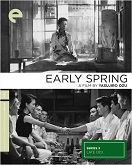Early Spring

Starring: Ryo Ikebe, Keiko Kishi, Chikage Awashima, Tiji Takahaski, Chishu Ryu, So Yamamura, Takako Fujino, Masami Taura, Haruko Sugimura, Kumeko Urabe
Directed by: Yasujiro Ozu
Rating: Not rated
Genre: Drama
1956
Times Seen:
Tim: 1
Summary: A working man (Ryo Ikebe) struggles with his wife (Chikage Awashima) and begins an affair with an energetic coworker (Keiko Kishi).
Review:
Tim: Early Spring is the second Yasujiro Ozu film I've seen, after his masterpiece, Tokyo Story. I think inevitably, this film would pale somewhat in comparison to that one. That's okay. Early Spring might not make the emotional impact that film does, but it's still a beautifully crafted film that captures something true about humanity. I found this film quite interesting and entertaining. I wouldn't quite consider it a "great" film, but it's undoubtedly a thoroughly enjoyable one.
Ozu has such a remarkable ability to capture something that feels so authentic in his films. Here, he trains his eye on the working man in postwar Japan. Our protagonist, Sugiyama is a salaryman. Ozu uses this character to introduce us to the details of the white-collar worker, whose loyalty to the organization and the work often supersedes all other obligations. Through the film, he examines the often monotonous lifestyle, contrasted with the benefits of a regular paycheck and work that might not destroy the body, but potentially erodes the soul. I found this fascinating- the look at this lifestyle- interactions with the boss, the need to establish coworkers as friends, the little nuances of this work and the impact it makes on the totality of your life. None of this is shoved down our throats- Ozu takes his quiet, nuanced approach to all of this. This isn't a film with a sense of urgency, as it's 2.5 hour run time allows plenty of time for Ozu to explore these themes. It was interesting that this movie feels broader than Tokyo Story in some ways. We get a few moving shots, the camera feels slightly less pillared. There's more outside shots, too. All of this takes some effort to mine- Ozu isn't giving us overt answers or opinions here. He's simply capturing something about the world and inviting us in to ponder it, too.
While I was quite interested in this world he created, I didn't quite love the characters. I didn't feel an immense emotional attachment to them. Ryo Ikebe was effective in the lead role. His quiet demeanor pulled us in, and his subtle emotions made his character fascinating. I'd often wonder what he was thinking or feeling, but forced to hold that deep inside. Ikebe gave a strong performance in the lead. Chikage Awashima was effective as his wife. I felt like she was a bit underdeveloped- we get time with her, but never really understand her as deeply as I wish we did. Her performance is good, her character just needed more time. Keiko Kishi is memorable as "the other woman". She played her with a sweet naivety, whereas she never seemed scheming, just a human being trying to make connections in a way that flies in the face of convention and has potentially devastating consequences. Her interactions with Ikebe worked and the movie got more interesting whenever they shared the screen. It was nice seeing Chishu Ryu in a small role, after his stunning work in Tokyo Story. Haruko Sugimura and Kumeko Urabe both made strong impressions in their supporting roles, too. The cast as a whole felt authentic and intriguing. Ozu certainly got consistently strong performances from everyone.
I enjoyed following these characters and seeing the ups-and-downs of their lives. The central thrust of the story might be the affair the main character has, but Ozu spends surprisingly little time on that. He's equally interested in watching our protagonist visiting a sick friend, or reconnecting with his war buddies. We spend time with Mrs. Sugiyama, as she laments the tragedy that fractured the relationship with her husband, while performing her daily duties and contemplating the change in the man she married. This film feels less "about" any one thing, and more of a tapestry of life in Japan at this time. That's where Ozu differs from many other directors. His approach is powerful and memorable.
I think it's unfair to compare any movie Ozu makes to Tokyo Story. That's a movie I absolutely adore and it's incredibly difficult to use that as a measuring stick. Early Spring might not have the raw power of that film, but it's quietly beautiful. It gives us a great deal to ponder. It's exceptionally well crafted, from beginning to end. The film's most iconic moment is undoubtedly the scene near the end, where the two workers having the affair are sitting, surrounded by their friends. They reach out across the table and shake hands. In the movie itself, I nearly gasped out loud when I watched this beautiful, poignant moment. It takes a long time for Ozu to get to that shot, but it's unforgettable when it happens. Not surprising, after seeing the film and doing some reading about it online, that's the image that comes up most frequently. It's a stunning moment in the film, perfectly framed by Ozu.
So yes, Early Spring is a triumph. I believe it's Ozu's longest film. It certainly takes some time to develop, but it's worth the investment. Ozu delivers a powerful, touching film that asks questions more than it answers. It's a movie well worth visiting.
Rating 1-10
Tim's Rating: 7.5
If You Enjoyed This Movie, We Recommend: Tokyo Story, Early Summer, Late Spring
